Northwestern Sends Second Delegation to COP27
For a second year, Northwestern University is sending a delegation of faculty and graduate students to the United Nations Climate Change Conference of the Parties (COP27). The delegates plan to share and conduct research, gain insight into burgeoning technologies and solutions and connect with other experts investigating issues at the forefront of sustainability. The members of Northwestern’s delegation are also forging new connections with each other, finding intersections between their disparate disciplines and aims to advance climate action. Among the 12 members of the delegation are:
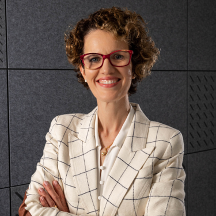 Dr. Annelise Riles is Executive Director of the Northwestern Roberta Buffett Institute for Global Affairs, Northwestern University Associate Provost for Global Affairs and professor of law and anthropology. Riles' scholarship spans a wide range of substantive areas including human rights, managing and accommodating cultural differences, and the regulation of the global financial markets. She will serve as the head of the delegation and will be moderating a panel at COP called “Universities as key solutions providers: leveraging our local and global networks for innovation” with university partners in the U7+ Alliance of World Universities, for which Northwestern serves as Secretariat, as well as the Worldwide Universities Network, the Italian University Network for Sustainable Development and the University Climate Change Coalition. Learn more about the panel discussion and how to tune in.
Dr. Annelise Riles is Executive Director of the Northwestern Roberta Buffett Institute for Global Affairs, Northwestern University Associate Provost for Global Affairs and professor of law and anthropology. Riles' scholarship spans a wide range of substantive areas including human rights, managing and accommodating cultural differences, and the regulation of the global financial markets. She will serve as the head of the delegation and will be moderating a panel at COP called “Universities as key solutions providers: leveraging our local and global networks for innovation” with university partners in the U7+ Alliance of World Universities, for which Northwestern serves as Secretariat, as well as the Worldwide Universities Network, the Italian University Network for Sustainable Development and the University Climate Change Coalition. Learn more about the panel discussion and how to tune in.
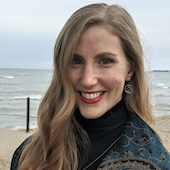 Lauren M. Baker is a PhD candidate in the Political Science Department of the Northwestern Weinberg College of Arts and Sciences. Her dissertation research explores waste management and the intersection of local, domestic and international priorities at sites of global environmental governance like the COP. She analyzes the evolution of environmental discourse and different perceptions of and experiences with waste and the infrastructures that manage it.
Lauren M. Baker is a PhD candidate in the Political Science Department of the Northwestern Weinberg College of Arts and Sciences. Her dissertation research explores waste management and the intersection of local, domestic and international priorities at sites of global environmental governance like the COP. She analyzes the evolution of environmental discourse and different perceptions of and experiences with waste and the infrastructures that manage it.
 Dr. Vilna Bashi is the Osborn Professor of Sociology in the Northwestern Weinberg College of Arts and Sciences as well as a visual artist. Her scholarship theorizes about international migration, race and ethnicity as well as the dynamics of hierarchical socioeconomic structures both domestically and internationally. At COP27, she plans to advocate for communities which have been denigrated by racism and colonialism and now face pressing and devastating socioeconomic impacts of climate change.
Dr. Vilna Bashi is the Osborn Professor of Sociology in the Northwestern Weinberg College of Arts and Sciences as well as a visual artist. Her scholarship theorizes about international migration, race and ethnicity as well as the dynamics of hierarchical socioeconomic structures both domestically and internationally. At COP27, she plans to advocate for communities which have been denigrated by racism and colonialism and now face pressing and devastating socioeconomic impacts of climate change.
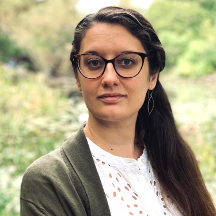 Diana Elhard is a PhD Candidate in the Political Science Department of the Northwestern Weinberg College of Arts and Sciences. Her subfields are international relations and methods. Diana is broadly interested in global environmental politics, international organizations and qualitative methods. Her dissertation work focuses on international climate finance and the United Nations Framework Convention on Climate Change, the treaty that established a framework for international cooperation to combat climate change and the annual COP.
Diana Elhard is a PhD Candidate in the Political Science Department of the Northwestern Weinberg College of Arts and Sciences. Her subfields are international relations and methods. Diana is broadly interested in global environmental politics, international organizations and qualitative methods. Her dissertation work focuses on international climate finance and the United Nations Framework Convention on Climate Change, the treaty that established a framework for international cooperation to combat climate change and the annual COP.
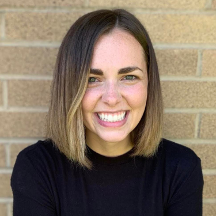 Chloe Haderlie Saunders is a master's student in Engineering Design Innovation program at the Segal Design Institute in the Northwestern McCormick School of Engineering. She became involved in sustainable design efforts as a teaching assistant for the Northwestern Institute for Sustainability and Energy (ISEN). Chloe plans to leverage her experience in community building and real estate development to explore how to improve collaboration between community residents and investment stakeholders. At COP27, she also plans to investigate the cutting-edge solutions available for revolutionizing urban environments and understand the barriers to implementing these solutions.
Chloe Haderlie Saunders is a master's student in Engineering Design Innovation program at the Segal Design Institute in the Northwestern McCormick School of Engineering. She became involved in sustainable design efforts as a teaching assistant for the Northwestern Institute for Sustainability and Energy (ISEN). Chloe plans to leverage her experience in community building and real estate development to explore how to improve collaboration between community residents and investment stakeholders. At COP27, she also plans to investigate the cutting-edge solutions available for revolutionizing urban environments and understand the barriers to implementing these solutions.
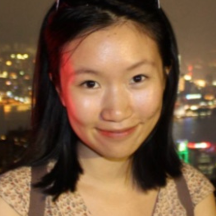 Katherine Hsu is a student at the Northwestern Pritzker School of Law, where she is a part of the Environmental Law Society. She is conducting research for a note in the Journal of Technology and Intellectual Property examining climate change and insurance and how regulations and statutes affect the two. At COP27, she aims to better understand the effect of negotiations on insurers with climate change-related disclosure rules.
Katherine Hsu is a student at the Northwestern Pritzker School of Law, where she is a part of the Environmental Law Society. She is conducting research for a note in the Journal of Technology and Intellectual Property examining climate change and insurance and how regulations and statutes affect the two. At COP27, she aims to better understand the effect of negotiations on insurers with climate change-related disclosure rules.
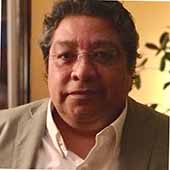 Dr. Reynaldo Morales is a Northwestern Buffett Faculty Fellow and Assistant Professor at Northwestern University’s Medill School of Journalism, Media, and Integrated Marketing Communications. He is also part of the International Indigenous Peoples for Climate Change (IIPFCC) group, and his research and practice connect with the need to ensure that Parties’ plans to accelerate the development, deployment and dissemination of technologies include Indigenous Peoples’ knowledge and solutions to transition towards low emission energy systems. At COP27, he will participate in the Intergovernmental Panel on Climate Change Assessment and ensure the meaningful representation of Indigenous Peoples.
Dr. Reynaldo Morales is a Northwestern Buffett Faculty Fellow and Assistant Professor at Northwestern University’s Medill School of Journalism, Media, and Integrated Marketing Communications. He is also part of the International Indigenous Peoples for Climate Change (IIPFCC) group, and his research and practice connect with the need to ensure that Parties’ plans to accelerate the development, deployment and dissemination of technologies include Indigenous Peoples’ knowledge and solutions to transition towards low emission energy systems. At COP27, he will participate in the Intergovernmental Panel on Climate Change Assessment and ensure the meaningful representation of Indigenous Peoples.
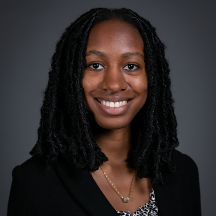 Taylor Nchako is a third-year student at Northwestern Pritzker School of Law. She spent a year in the Environmental Advocacy Clinic at Northwestern working on water governance in Zambia and environmental justice in Chicago. Taylor is the Online Editor-in-Chief of Northwestern University Law Review, which will publish an online essay series about climate change and infrastructure in spring 2023, topics which she plans to explore at COP27.
Taylor Nchako is a third-year student at Northwestern Pritzker School of Law. She spent a year in the Environmental Advocacy Clinic at Northwestern working on water governance in Zambia and environmental justice in Chicago. Taylor is the Online Editor-in-Chief of Northwestern University Law Review, which will publish an online essay series about climate change and infrastructure in spring 2023, topics which she plans to explore at COP27.
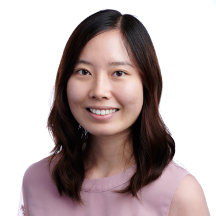 June Qian is pursuing a Master’s in Business Administration at the Northwestern Kellogg School of Management. Qian previously worked as an Energy and Sustainability Engineer for ExxonMobil. She implemented several initiatives to reduce flaring of greenhouse gases, but still found it challenging to convince others to prioritize sustainability. At COP27, she will develop her toolkit to help businesses in the energy industry create strategies to implement a sustainable future. Upon graduating this spring, she will bring her expertise to McKinsey and Company.
June Qian is pursuing a Master’s in Business Administration at the Northwestern Kellogg School of Management. Qian previously worked as an Energy and Sustainability Engineer for ExxonMobil. She implemented several initiatives to reduce flaring of greenhouse gases, but still found it challenging to convince others to prioritize sustainability. At COP27, she will develop her toolkit to help businesses in the energy industry create strategies to implement a sustainable future. Upon graduating this spring, she will bring her expertise to McKinsey and Company.
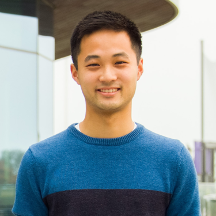 Takaaki Sagawa is a PhD candidate in the Economics Department. At COP27, he aims to dialogue with experts in climate finance from academia and government institutions to inform his research on the market design of emissions trading schemes. He also hopes to share his expertise in the political economy of climate reforms, both at the national and international level, with policymakers. In addition to the receiving support from the Northwestern Buffett Institute for Global Affairs, Takaaki is funded by the International Monetary Fund and the Japanese Ministry of Finance.
Takaaki Sagawa is a PhD candidate in the Economics Department. At COP27, he aims to dialogue with experts in climate finance from academia and government institutions to inform his research on the market design of emissions trading schemes. He also hopes to share his expertise in the political economy of climate reforms, both at the national and international level, with policymakers. In addition to the receiving support from the Northwestern Buffett Institute for Global Affairs, Takaaki is funded by the International Monetary Fund and the Japanese Ministry of Finance.
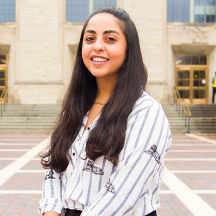
Niloufar (Nilou) Sarvian is a PhD candidate in the Earth and Planetary Sciences (EPS) Department studying climate. Her doctoral research uses geochemistry to study Earth's past oceans and climate. At Northwestern, Sarvian co-founded GeoEquity, a diversity and equity initiative in the EPS Department. At COP27, she aims to dialogue with the decarbonization and ocean policy communities to share her climate expertise and perspective on the role of long- and short-term carbon cycles in influencing policy. Upon graduating this spring, Sarvian will join Marble, a climate tech accelerator program in Paris, to work in the marine carbon dioxide removal field.
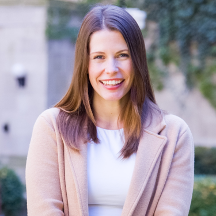 Regan Seckel is a third-year student at Northwestern Pritzker School of Law, where she serves as a student-attorney at the Center for International Human Rights in the Bluhm Legal Clinic. In this position, she is currently working with two NGOs, the International Platform for Corporate Liability and the Organization for Community Engagement, to organize a people’s tribunal to investigate three sectors for crimes against humanity or ecocide, an offense that the International Criminal Court does not yet have jurisdiction over. One of the goals is to show that such a conviction could be sustained based on the evidence. At COP27, she will network with organizations across the globe to recruit members of civil society to participate in the people’s tribunal, either to contribute evidence of how corporations have caused environmental destruction in their region or serve on the jury to issue the final opinion.
Regan Seckel is a third-year student at Northwestern Pritzker School of Law, where she serves as a student-attorney at the Center for International Human Rights in the Bluhm Legal Clinic. In this position, she is currently working with two NGOs, the International Platform for Corporate Liability and the Organization for Community Engagement, to organize a people’s tribunal to investigate three sectors for crimes against humanity or ecocide, an offense that the International Criminal Court does not yet have jurisdiction over. One of the goals is to show that such a conviction could be sustained based on the evidence. At COP27, she will network with organizations across the globe to recruit members of civil society to participate in the people’s tribunal, either to contribute evidence of how corporations have caused environmental destruction in their region or serve on the jury to issue the final opinion.
After COP27, the delegates will synthesize their research for their dissertations and journal notes as well as share insights into new innovations in sustainability through collaborating with registered student organizations and more.
